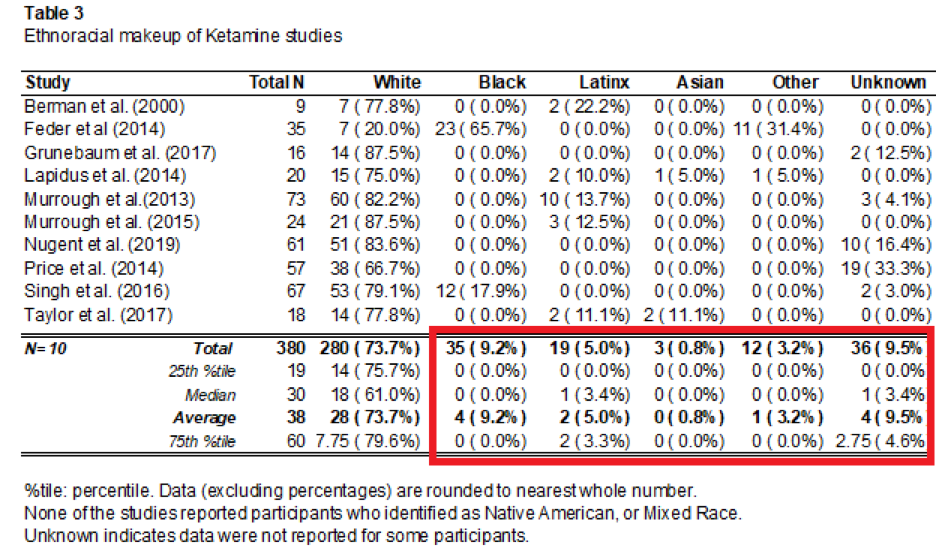Ketamine Research
Inclusion of People of Color in Ketamine Clinical Trials
Emerging evidence from randomized, double-blind, placebo-controlled clinical trials suggests that psychedelic compounds may be beneficial in the treatment of mental health and substance use disorders. Although there is a rich and extensive global history of psychedelic use among peoples of various cultures, ethnicities, and intersectional identities, psychedelic research has been conducted almost exclusively among White participants in North America and Western Europe.
The failure to include black, indigenous, and people of color (BIPOC) in psychedelic research trials both creates disparities in treatment access and neglects the ethnic, racial, and cultural factors that impact individual responses to psychedelic-assisted psychotherapies. Previous ethnopsychopharmacological research has indicated notable ethnoracial differences in the metabolism, safety, and efficacy of psychotropic drugs, yet no studies have directly investigated the impact of ethnoracial-based differences in psychedelic drug pharmacology.
We conducted a comprehensive literature review investigating the impact of varying ethnopharmacological factors on psychedelic treatment outcomes, including genetic and epigenetic factors related to culture, ethnicity, and race that may alter clinical responses as well as the social determinants of health that negatively impact BIPOC more broadly and are equally relevant to psychedelic medicine. We discuss the potential cultural, clinical, and public health benefits of expanding funding for this area and draw attention to the unique and individualized needs of ethnoracially diverse clients in therapeutic settings.

Publication
Michaels, T. I., Lester, L., de la Salle, S., & Williams, M. T. (2022). Ethnoracial inclusion in randomized, double-blind, placebo-controlled clinical trials of ketamine in the treatment of mood disorders. Journal of Studies on Alcohol and Drugs, 83(4), 596–607.
Ketamine-Assisted Psychotherapy for PTSD Related to Racial Discrimination

Current ongoing research suggests that ketamine-assisted psychotherapy has benefit for the treatment of mental disorders. In this report, we discuss the results of ketamine-assisted intensive outpatient psychotherapeutic treatment of a client with treatment-resistant, posttraumatic stress disorder (PTSD) as a result of experiences of racism and childhood sexual abuse. The client's presenting symptoms included hypervigilance, social avoidance, feelings of hopelessness, and intense recollections. These symptoms impacted all areas of daily functioning. Psychoeducation was provided on how untreated intergenerational trauma, compounded by additional traumatic experiences, potentiated the client's experience of PTSD and subsequent maladaptive coping mechanisms. Ketamine was administered four times over a thirteen-day span as an off-label adjunct to psychotherapy.
Psychotherapeutic approaches included mindfulness-based cognitive therapy (MBCT) and functional analytic psychotherapy (FAP). New skills were obtained in helping the client respond effectively to negative self-talk, catastrophic thinking, and feelings of helplessness. Treatment led to a significant reduction in symptoms after completion of the program, with gains maintained four months post-treatment. This case study demonstrates the effective use of ketamine as an adjunct to psychotherapy for treatment-resistant PTSD.
Publication
Halstead, M., Reed, S., Krause, R., & Williams, M. T. (2021). Ketamine-assisted psychotherapy for PTSD related to experiences of racial discrimination. Clinical Case Studies, 20(4), 310-330.
Related Presentation
Williams, M. (2020, November 12). Ketamine-assisted psychotherapy for PTSD related to experiences of racial discrimination. In D. Bernard (chair), Identifying Barriers and Mechanisms for the Treatment of Racial Trauma Among Black Communities: Implications for Bridging Science and Practice. Symposium for International Society for Traumatic Stress Studies.